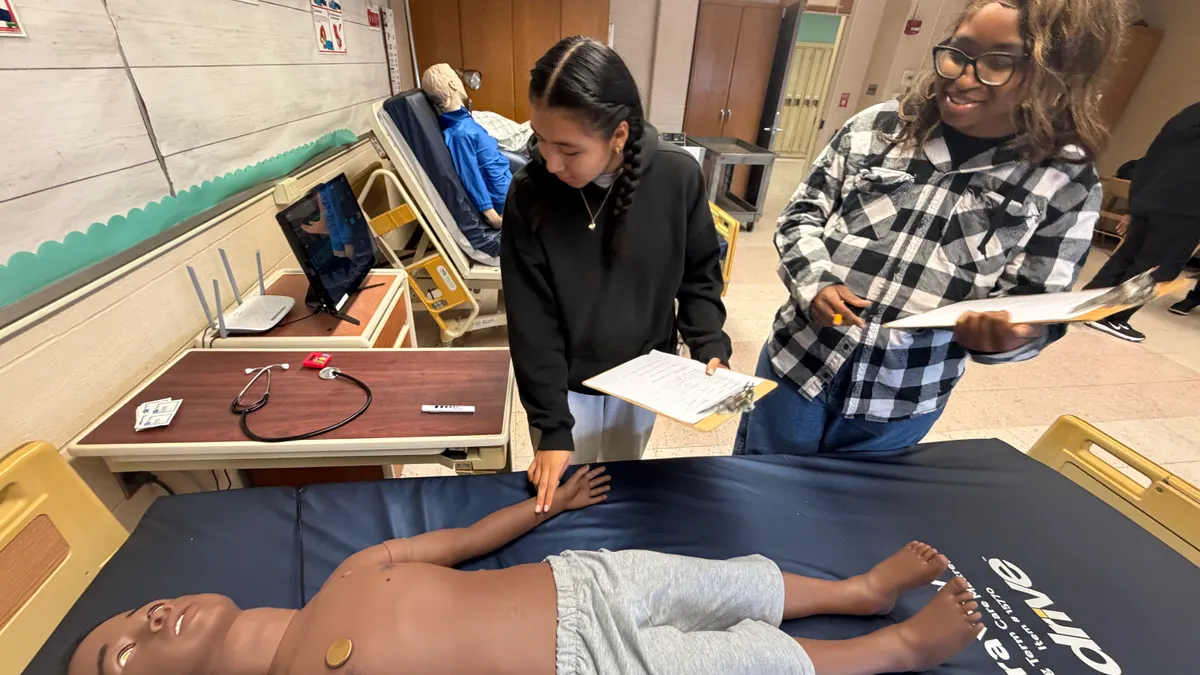History teacher Stuart Wexler didn’t want his students to count on their cold case bill becoming law. Sure, he had hopes — as did they. But a high school civics class drafting a bill that would become a federal law? That had never been done before, he said, until his class saw their bill, the Civil Rights Cold Case Records Collection Act, signed in January 2019.
“The odds were pretty darn long,” Wexler, who has taught AP U.S. Government and Politics for the last 13 years at Hightstown High School in New Jersey, told Education Dive. “It was hard to hide that from students, but we proceeded as if this was going to happen.”
In Wexler’s case, the bill did become law, and in the process he learned three things that strengthened his work as an educator.
Lesson one: Toss out grades
Students are a driven lot, with grades almost always the carrot that gets them motivated from the start. But when a grade is the goal, students sometimes limit themselves particularly when they’re creating a project they want to succeed.
Wexler tossed the grades right out when he embarked on this mission. And while he knows it’s a debatable proposition, he believes when students know they won’t be graded on the endeavor, they may be more ambitious in the path and issue they select to champion.
They’re also more likely to buy into a cause, even if it’s not something they think may succeed. If they know that they can’t fail, at least not in relation to their report card, they can focus on the path — in this case how to move a bill forward — rather than the result.
“Think about that from the start when you sell the whole concept, ” said Wexler. “Tell the students you aren't grading it. Let them pick a cause they promise to focus on even if it is not graded.”
Focusing on the method rather than the result also encourages students to think through the process. That requires them to analyze each step and, instead of panicking, choose to brainstorm and retool their approach — just as politicians and lawmakers do in real life.
“We want kids to come out to be critical thinkers, because we need them to be able to read between lines and understand what’s thrown at them,” said Arlene Gardner, executive director and founder of the New Jersey Center for Civic Education at Rutgers University, told Education Dive.
Lesson two: Open the classroom doors
Anyone who watches C-SPAN knows politics is rarely done inside the physical chambers of Congress. To make law, bills must be written. But politics is the art of negotiation, the conversation and push-pull dialogue that needs to happen between to turn a concern into codified law.
Wexler believes if students are going to try to understand how a bill is passed, they need to go through the actual motion of getting their message across to people. Writing a bill is certainly crucial. Convincing others that it needs to be passed takes an entirely different skill set. That means getting out into your community, talking with people and engaging others on the issue.
“Reach out beyond your classroom walls, literally and figuratively,” he said. “That means letting kids go into the hallway to make lobbying calls if need be, but also see if outside lobbyists will conference with you.”
In Washington state, students are encouraged to take an active role in their community to understand the role they can play by being civically involved. They may not write bills that make their way to Congress, but that doesn’t mean they’re not playing a crucial role in society.
Jerry Price, social studies program supervisor for the State of Washington’s Office of Superintendent of Public Instruction, told Education Dive his former students created community gardens and addressed community problems from hunger to homelessness as part of what they’re taught in class, stretching the classroom outside their school.
“The expectation that students are going to become civically involved, whether contacting a legislator, engaging in a community project, or supporting other civic action, is already baked in to the lessons,” he said.
Lesson three: Be persistent
Even with a bill as politically neutral as opening up cold cases, Wexler’s students were still surprised by the resistance they faced. But he believes that if educators want to encourage students to get actively involved in their communities, they need to expect they’ll be challenged. Therefore, they need to be prepared to find the perseverance in themselves to stay motivated and focused — real skills needed to make any change a reality.
“It’s me modeling, but then they figure out themselves about being persistent, and how to invest their resources and energy,” said Wexler. “It’s very much a problem-solving type of mindset, that if someone closes a door, how are you going to get through.”


















